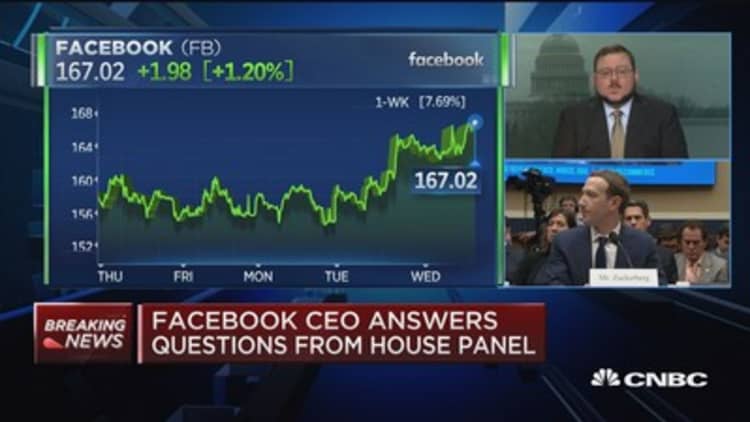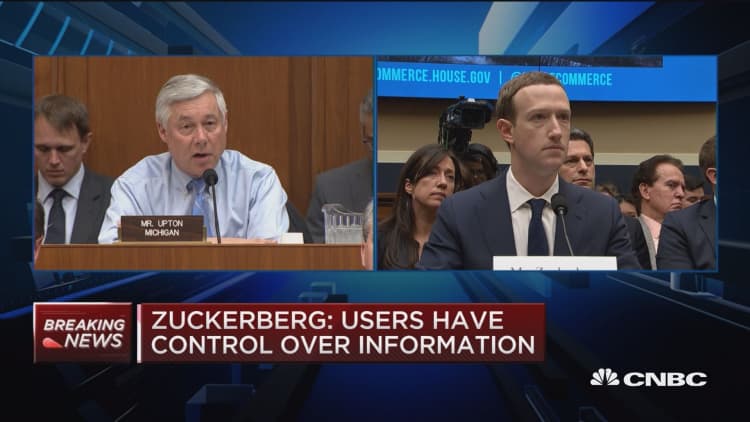
Increased regulation in the technology sector would be good for Facebook but bad for its competitors, said Kevin Knight, former Team Lead of Facebook Creative Shop in New York.
"The harder the government makes it for companies to access shared data or data that changes places, that changes between different platforms," Knight told CNBC, "the stronger it makes companies that have access to tons of data within their own right. That means Facebook, Amazon, Google."
"Any regulation that emerges from this is most likely to entrench Facebook and hurt competition," Knight said Wednesday on "Power Lunch."
Facebook CEO Mark Zuckerberg testified on Capitol Hill for a second day on Wednesday. The hearings are a first step in determining the need for increased regulation in the tech sector following the Cambridge Analytica scandal, which revealed that data from approximately 87 million Facebook users was improperly used. Facebook is not currently regulated by the government, but Zuckerberg said during Wednesday's testimony that he is open to regulation.
The two-day hearing "revealed a knowledge gap," said Rep. Ro Khanna, D-Calif. Several members of Congress "don't fully have a grasp on how social media works," he said Wednesday on "Closing Bell."
Khanna pointed out that Europe has the General Data Protection Regulation, a regulatory framework to protect individuals.
"We need a similar internet bill of rights here in the United States," he said.
But Facebook's CEO knows the platform better than anyone, Knight said. The best results would come if Zuckerberg implemented new regulation himself.
"There's this notion that Facebook can't regulate itself," said Knight, who now works as a consultant. "The reality is if Congress doesn't understand how internet advertising works or how technology works or how Facebook works, they can't regulate" them.
"Congress ... [doesn't] understand the issues well enough to be trusted by the American people to address them," said Knight.
But while many politicians may not understand how to use Facebook, said Ryan Radia, research fellow and regulatory counsel at the Competitive Enterprise Institute, they may still regulate it.
Radia said some "have indicated that they might be open to creating new rulemaking authority for agencies like the Federal Trade Commission, which could, under a more proactive approach, do a lot to regulate in the space or to punish companies for behavior they've already entered into."
A "hyper-regulated tech sector would look a lot drearier," he said Wednesday on "Power Lunch."
When regulators "impose strict rules, you don't get the same sort of innovation, risk-taking and dynamism that you see in the tech sector," Radia said.
But the need for politicians to educate themselves on new technology is nothing new, said Franklin Foer, a staff writer for The Atlantic magazine and political commentator.
"Politicians don't understand the way that our aviation system works," Foer said Wednesday on "Power Lunch." "Yet, I think we're all grateful that we've set up aviation rules; that there [are] air traffic control systems that [are] nationalized."
"Our regulators have proven themselves to be next to useless in dealing with these [technology] companies," said Foer, author of "World Without Mind: The Existential Threat of Big Tech." "The culture's changing, society's expectations are changing, and the rules that govern our economy are going to have to change, too, or we're going to have to wake up 30 years from now really seriously regretting it."
Competition among internet companies is healthy, Khanna said.
"I'm not worried about [Facebook's] business model," he said. "They're going to be fine. I want to make sure there are other social media networks that can create competition."
"What Congress needs to do is not prescribe the exact tools or the exact formula that Facebook should use," Khanna said. "We should set out the general principles that give people the rights in the cyber world that they have in their ordinary lives."
WATCH: Zuckerberg says some regulation inevitable



